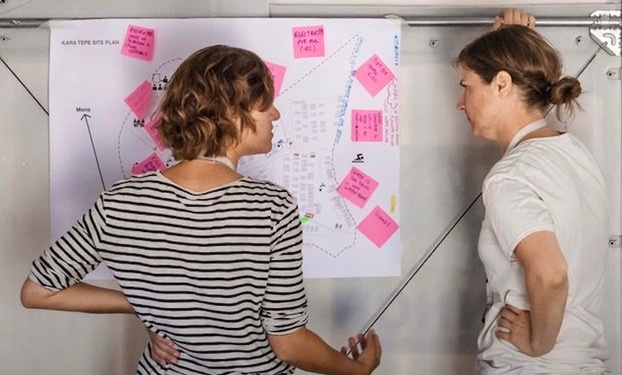Office of Displaced Designers (ODD) is calling on UK construction professionals for urgent funding to equip architects and designers in Gaza with the skills to rebuild from the ruins of their homeland. Founder Shareen Elnaschie and one of the co-directors Elizabeth Cunningham explain how you can help.
What is Office of Displaced Designers?
ODD is a creative nonprofit that supports the talents and aspirations of displaced and marginalised designers and their wider communities. We do this by facilitating access to resources, training and networks, and work on projects focusing on the built environment and culture. We also provide research, design and consultancy services.
Shareen, how did Office of Displaced Designers come about?
Shareen Elnaschie The story of ODD begins on Lesvos Island in Greece during the so-called “European Refugee Crisis”, shortly after the EU-Turkey deal came into effect in 2016. I’m a trauma informed architectural designer with international experience of working with marginalised groups and I had moved to Lesvos to work at the now-closed Kara Tepe Camp that hosted approximately 1500 people. Whilst there, I met many individuals with creative backgrounds – from engineers to fine artists. They were united in missing their craft, distressed by the loss of portfolios and networks, and consequently denied opportunities to re-engage in their work. These conversations sparked the initial idea for ODD: to establish a design collective that centred the talents and aspirations of displaced and marginalised designers and deployed their skills to improve their situation and environment.
Elizabeth, how has ODD evolved?
Elizabeth Cunningham In 2020, after becoming disillusioned with conventional practice in the UK, I went to Izmir, Turkey to volunteer with organisations supporting the displaced population there. This is where I met Shareen and our two other co-directors, Robert Mull and Amalia Katopodis, and where ODD became the roving design office that it is today. Because we’re not fixed to a single location, we have a wider point of view and the flexibility to address migration issues when and where they arise. In November we will collaborate with Homeing Project in Yerevan, Armenia to explore ways of creating a prototype design collective that draws inspiration from ODD’s philosophy. We also have a couple of upcoming projects in Izmir: an earth building workshop as well as a long-term construction skills programme for women with refugee status.
Your vision statement talks about harnessing the power of design and design education to build inclusive and just societies. How do your projects align with this?
ODD was conceived as a space for people to come together through knowledge sharing and co-creation. Displaced and marginalised designers have a wealth of lived experiences and perspectives that are essential to incorporate if we’re committed to building equitable, inclusive and just communities. Whether we’re creating documentaries or shared social spaces, our projects aim to provide the infrastructure for all of this skill and ambition to develop and enact change. On a broader scale, we also hope to change the typical narrative associated with people who have been displaced and/ or marginalised. They have the same professional and creative aspirations that we all have. The difference is that their opportunities have collapsed because of circumstances beyond their control.
One of your current projects is “Rebuilding Gaza: Home, Street and Neighbourhood.” How did this initiative come about?
Rebuilding Gaza: Home, Street and Neighbourhood is a collaborative response to the urgent need for reconstruction in Gaza, where more than 60 per cent of the built environment has been decimated, approximately 2 million people forcibly displaced, and countless thousands killed and maimed. This workshop brings together displaced Gazan students, tutors, and practitioners for one month in Cairo and occupied Palestine to explore how to lead the recovery and reconstruction of Gaza through the lens of architecture and urban design. It’s the first ‘studio’ of the new Gaza Global University [GGU], a hybrid virtual and physical initiative led by Architects for Gaza [AFG]. The initiative is also supported by Global Free Unit [GFU] and Megawra Built Environment Collective [Megawra BEC].
What are the goals of this Gaza initiative?
Our collective goal is to reimagine the transformation of Gaza and ensure that recovery and reconstruction efforts are rooted in local community practices centred on healing the land and its people. The work produced during this workshop will be equivalent to one semester of study and will be accredited by university partners, including An-Najah National University. The results will also be shared through a publication and travelling exhibition that generates hope and secures the physical, human, and academic resources needed to continue this vital work.
How can people support your work for Gaza?
We’re aiming to raise €35,000 to provide full sponsorships for students, competitive honorariums for out-of-work tutors, psychosocial support, and other essential needs for up to sixty participants. £25 would sponsor a participant for a day. £125 would sponsor a participant for one week. There is also the option to create a connected fundraiser as a way to engage your wider community or workplace. Donations can be made directly through our website: https://www.displaceddesigners.org/rebuild-gaza
And if you have questions about sponsorship or fundraising, please contact Shareen: [email protected]
Source: Architecture Today

